On the evening of 17 February 2016, Ben van Beurden, the chief executive of oil giant Shell, picked up his phone and dialled the number of the Anglo-Dutch corporation’s chief finance officer, Simon Henry. The topic of their conversation: a “dawn raid” on the company’s headquarters earlier that day by Dutch police investigating a controversial $1.3 billion Nigerian oil deal struck five years previously.
That deal – the acquisition of the exploration licence for an offshore oil block known as OPL 245 – had been regarded by Shell as a major accomplishment. But from the moment it was secured, it had become mired in allegations of bribery and corruption against Shell and its Italian partner in the acquisition, ENI – allegations that both companies have strenuously denied.
On the call, van Beurden – who became Shell CEO in 2014 after working in the company’s chemicals division, and so had no involvement in the deal – described the raid to Henry, who had been on leave. After detailing how officers had spent hours searching executive offices, the CEO turned to emails exchanged between two former MI6 officers Shell had hired.
“There was apparently some loose chatter between people from a team, particularly the people that we hired from MI6…er who…er must have said things like ‘Well, yeah, you know, I wonder who gets a payoff here’ and whatever so…er helpful – unhelpful email exchanges,” van Beurden told Henry. “I haven’t seen them but apparently it was judged to be, y’know, just pub talk in emails, which was stupid, but nevertheless, is there …”
What van Beurden didn’t know was that the call was being intercepted by the Dutch authorities, who had been investigating the deal in a joint operation with an Italian prosecutor, Fabio De Pasquale.
That recording, along with the former MI6 agents’ emails and hundreds of other documents, have been obtained by BuzzFeed News and Italian newspaper Il Sole 24 Ore in a joint investigation that reveals that Shell’s top executives at the time signed off the deal with full knowledge that the money would go to a front company connected to a former Nigerian oil minister, Dan Etete.
The documents also show that Shell employees knew of – and explicitly discussed – the risk payments could be used by Etete to pay people off.
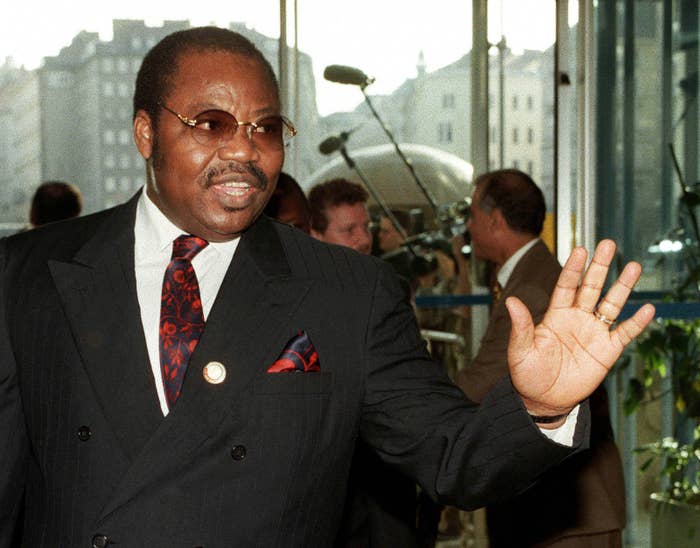
For years, Shell has denied the deal involved any payments from Shell or ENI to Etete – who has been convicted in his absence of money laundering in France in a separate case – or to the company he allegedly controlled, Malabu Oil and Gas.
In a 2014 statement to campaign group Global Witness, Shell stated: "No payments were made by either NAE [an ENI subsidiary] or SNEPCo [a Shell subsidiary] to Malabu Oil and Gas". In 2015, Shell was similarly clear: "No payments were made by any Shell company to Malabu Oil and Gas in relation to the issuance by the Federal Government of Nigeria (FGN) of the OPL 245 license to Shell Nigeria Exploration & Production Ltd and Nigerian Agip Energy (NAE)".
But the cache of documents obtained by BuzzFeed News and Il Sole 24 Ore reveals that:
- Shell executives knew the deal would benefit Malabu by more than $1 billion. In an October 2010 email between senior executives, executive board member Malcolm Brinded outlined the $1.3 billion deal to secure OPL 245, adding the structure “has the advantage that Malabu gets well over $1bln”. The deal was signed off by van Beurden’s predecessor as CEO, Peter Voser, as well as the CEO of ENI.
- In a 2009 email, a Shell employee described the deal as a "big apple”, adding: “We cannot afford to lose it.”
- During the dealmaking, the former MI6 agents considered contacting the UK High Commission to help Etete secure a UK visa, spoke of the need to convince Shell he was “a potential partner”, and debated taking him for a hunting trip – “stags in Scotland?”
- The agents considered this trip despite the fact that, as they noted in an email, Etete was “wanted by the French authorities and would risk arrest if he travelled to the UK”.
- The former MI6 agents discussed their belief Etete would use payments from a deal to pay bribes to others. “E claims he will only get 40m of the 300m we offering - rest goes in paying people off,” one email notes. In another, discussing why Etete was pushing for a quick deal, they noted a possibility that “he needs to get it over the line because he has promised payday to others”.
- A document attached to an internal email classified as “legally privileged and confidential” and sent by the VP Commercial for Africa of Shell stated: “In country view is that the President is motivated to see 245 closed quickly - driven by expectations about the proceeds that Malabu will receive and political contributions that will flow as a consequence”.
- Ednan Agaev, a former Russian ambassador and intelligence officer who worked on the deal as a representative of Malabu, told the FBI and Italian prosecutors that Etete had told him he needed to pay $400 million in bribes to senior Nigerian officials and parliamentarians.
- Jeffrey Tesler, who admitted guilt as part of a deal with US prosecutors in a separate case involving handling “commissions” for Etete, voluntarily handed over a suitcase containing more than £350,000, allegedly a “gift” from Etete, to a London police station after a company connected with him received $180 million of the proceeds of the deal.
- Italian prosecutor De Pasquale argued in court papers most of the funds paid by ENI and Shell were then wired to other recipients. He said it was reasonable to describe these transactions as “anomalous or suspicious” and that “reasonably appear to be connected to contexts of bribery”.
In a statement, Shell said it did not believe the company or any of its current or former colleagues had acted illegally.
“Based on our review of the Prosecutor of Milan's file and all of the information and facts available to Shell, we do not believe that there is a basis to prosecute Shell,” said a spokesman. “Furthermore, we are not aware of any evidence to support a case against any former or current Shell employee.”
A spokesman for ENI said: “ENI and Shell are fully cooperating with the relevant authorities in Italy and in Nigeria. We shall continue to cooperate with relevant authorities in the investigations and continue to underscore the fact that ENI and its personnel have not been involved in any wrongdoing.”
ENI said its deal for the block had been with the government of Nigeria. “Neither ENI nor Shell paid any monies other than as contemplated and recorded by the Block Resolution Agreement and did not pay to Malabu, to Chief Dan Etete or to any public officer,” the spokesman added.
An attempt to reach Dan Etete for comment was not returned. He has consistently denied any wrongdoing.
After years of controversy, the inside story of Shell’s role in the OPL 245 deal can now be told for the first time.
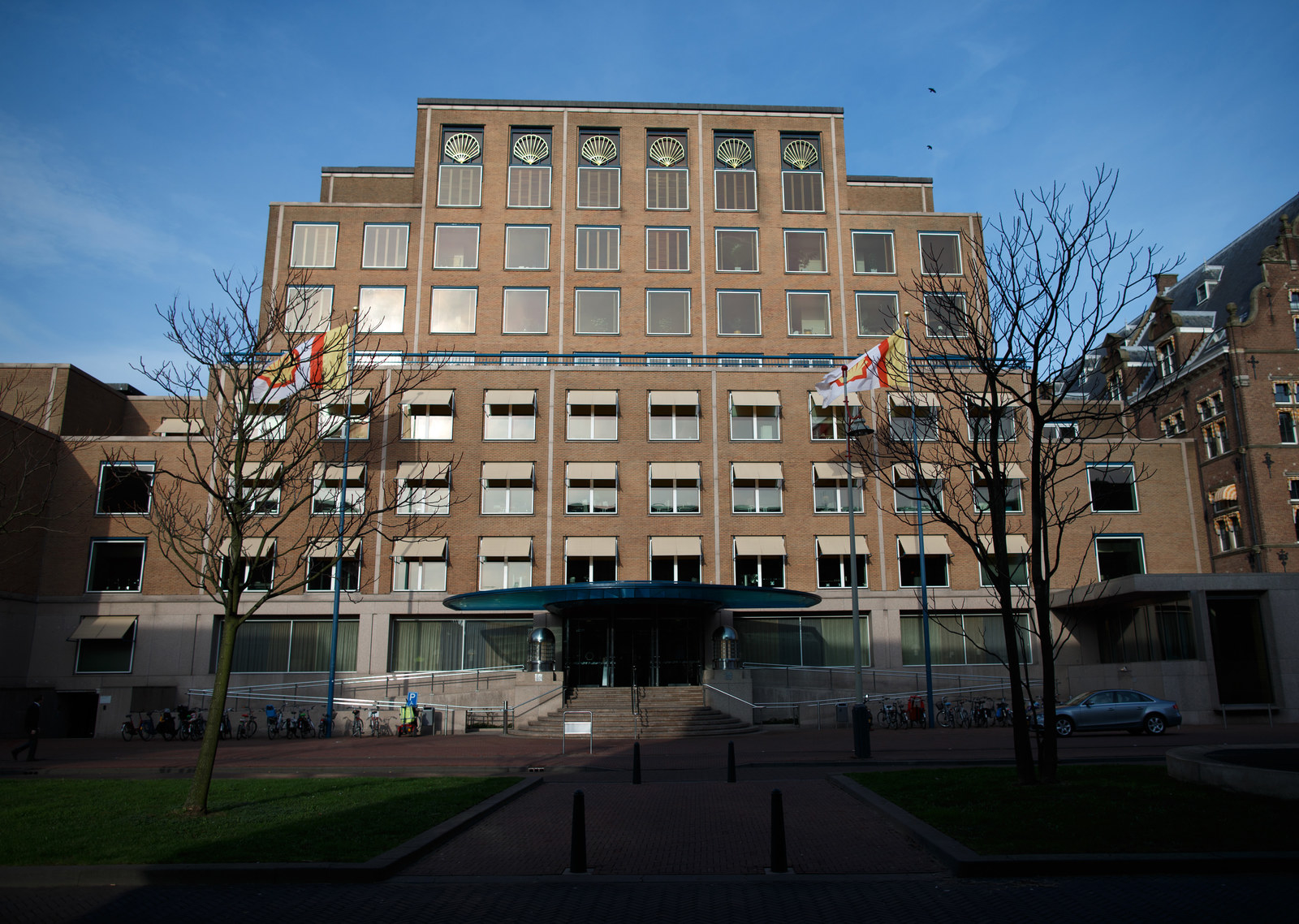

The deal
OPL 245 is an area of deepwater ocean off the south of the Niger Delta, containing billions of dollars' worth of oil and gas. In 1998 Dan Etete, then the minister for petroleum under the military dictatorship of General Sani Abacha, awarded the rights to the multibillion-dollar block to Malabu – a company he is alleged to have controlled, despite not appearing on any official paperwork as a shareholder or director.
What followed, after the sudden death of Abacha and the collapse of his regime, was years of legal wrangling and allegations of corruption, which saw Shell take a stake in the block, and the government seize the block from Malabu, then re-award it to the company years later, amid debates, court challenges, and international arbitration between Shell, Malabu, and the Nigerian government over who had the rights to extract the block’s oil.
The deal struck by Shell, ENI, Malabu, and the Nigerian government in 2011 was supposed to see an end to the years of back-and-forth: For a total consideration of $1.3 billion, the Nigerian government awarded the block to Shell and ENI.
It was years into this fraught process of negotiating a solution to OPL 245 that Shell engaged the two former MI6 agents – Guy Colegate and John Copleston – who helped deal with Etete and with officials in the Nigerian government.
Part of their task was to try to keep Etete – a volatile character who Shell clearly mistrusted – on side and willing to deal. During attempts to set up a face-to-face meeting in 2009, Copleston said he’d just spoken with Etete’s wife, who said Etete was “incensed” because he’d been refused a UK visa. “She has asked if I can sort out with the High Commission – said I would see what I could do but no promises,” he said. “Not sure this is the whole story as he is wanted by the French authorities and would risk arrest if he travelled to UK so this may just be a time waster.”
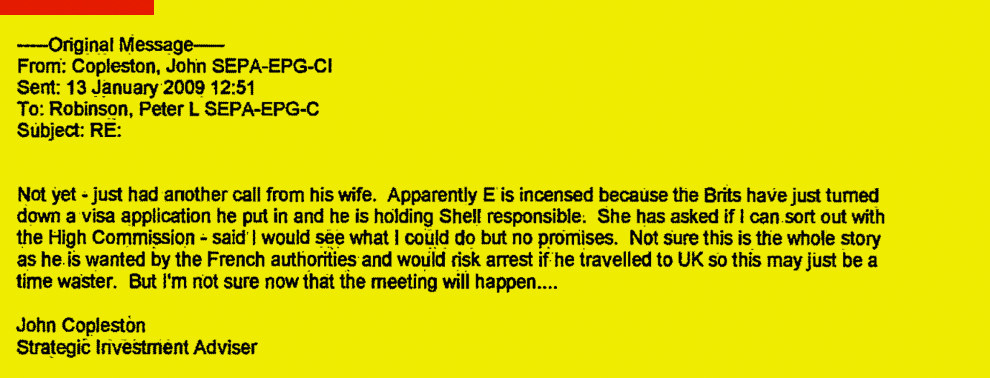
After Etete cancelled a proposed meeting with Copleston, Shell executive Ann Pickard cautioned: “do not make any effort to sort out his visa with the UK until its [sic] resolved.”
Late in 2009, Copleston and other Shell staff planned a dinner with Etete. “From a hearts-and-mind point of view we need to demonstrate we regard him as a potential partner rather than an entrenched adversary, and someone we can at least potentially do business with,” he wrote. “We know Etete is a keen big game hunter – to date as far as we know mainly in Africa. If this dinner goes well and ends on a good note, I think we should take up Guy’s idea of taking him out to Europe somewhere for a weekend’s hunting (stags in Scotland?).”


“Loony Tunes”
Copleston and Colegate didn’t just work on a charm offensive, though: They were busy gathering information on Etete, what he wanted, and why – and one thing they learned and repeatedly stated was their belief Etete was going to pay off others.
In one email to multiple Shell staff and executives, Copleston reported back on a meeting. “Saw my Delta man,” he said. His source then claimed "Mrs E" had told him Etete would only get $40 million of any offer.
“He spoke with Mrs E[tete] this morning. She says E[tete] claims he will only get 40m of the 300m we offering – rest goes in paying people off.”

BuzzFeed News was unable to track down Etete's wife for comment on her reported claim.
In another message – titled “Loony Tunes” – Colegate details possibilities as to why Etete is pushing for a quick deal. “[T]he chief is sending letters saying unless a deal comes very soon the contract with our man is void,” he wrote. “This may be because of two reasons: 1) he needs to get it over the line because he has promised payday to others or 2) and I suspect more likely – because he has another counterparty lining up.”
Another staffer claimed Etete had lots of “interests” to settle, so needed a large payout. “He [Etete] was told that with a huge chain of interests to settle particularly those who helped to take the former VP off the deal, he required a huge sum from Shell,” the email notes before concluding: “OPL is a big apple. We cannot afford to lose it. We need to devise new moves to engage Etete.”

Sealing the deal
BuzzFeed News has seen no evidence that Shell’s top echelon knew at the time about the conversations the former MI6 agents were having about Etete – but at least some were fully aware Etete was a convicted money launderer looking to benefit from the deal, the documents show, and even wondered if they could turn this to their advantage.
In response to a 2007 note saying that a French court had just sentenced Etete to a jail term and a $440,000 fine for money laundering, a Shell general counsel forwarded the message to executive board members: “Gentlemen, I thought the attached would be of interest to you,” he wrote. “We are considering how to turn this development to our advantage.”
Guy Outen, an executive vice president at Shell, replied: “makes it a bit difficult for the Govt … and us … to progress though”.
The documents also show executives knew that the former petroleum minister had control of Malabu for the purposes of the deal. In an email to a middleman for the former minister, Outen wrote: “thank you for your confirmation that you continue to act as legal advisor to Malabu and that Mr. Etete continues to represent Malabu under a power of attorney issued by Malabu.”

By 2008, Shell executives were reporting back on their dealings with Etete, who they knew wanted a minimum of $1 billion and wanted to deal with Shell. “Etete’s people have made contact with us,” wrote Ann Pickard, then regional executive vice president. “He wants direct dealings with Shell … he wants $1 bn”.
Starting in 2010 Shell began working with ENI on a possible joint deal. In their discussions, in which they often referred to Etete as “the Chief”, they discussed possible terms. One Shell email titled “Milanese movements” reported back “our friend says all parts in place – gov on board, his client and us – he says only chief can sink it – which he does not rule out. His client wants chief out the picture – incl off the paperwork for any transaction – chief’s rep will cause them issues if he has direct line of sight on paper to consideration”.

On 11 October 2010, executive director Malcolm Brinded emailed a number of executives with a proposal for the deal structure: Shell would release $210 million from a holding account, the $25 million of accrued interest on that account, and a further $85 million, signed off by the then-chief executive Peter Voser – “getting Peter to agree to put the above $85 mln cash on the table was naturally difficult,” Brinded noted – while ENI would provide the rest.
The headline value of the deal would be $1.3 billion. “Our firm intent is to keep it at this number,” Brinded stated, “which has the advantage that Malabu gets well over $1bln.”
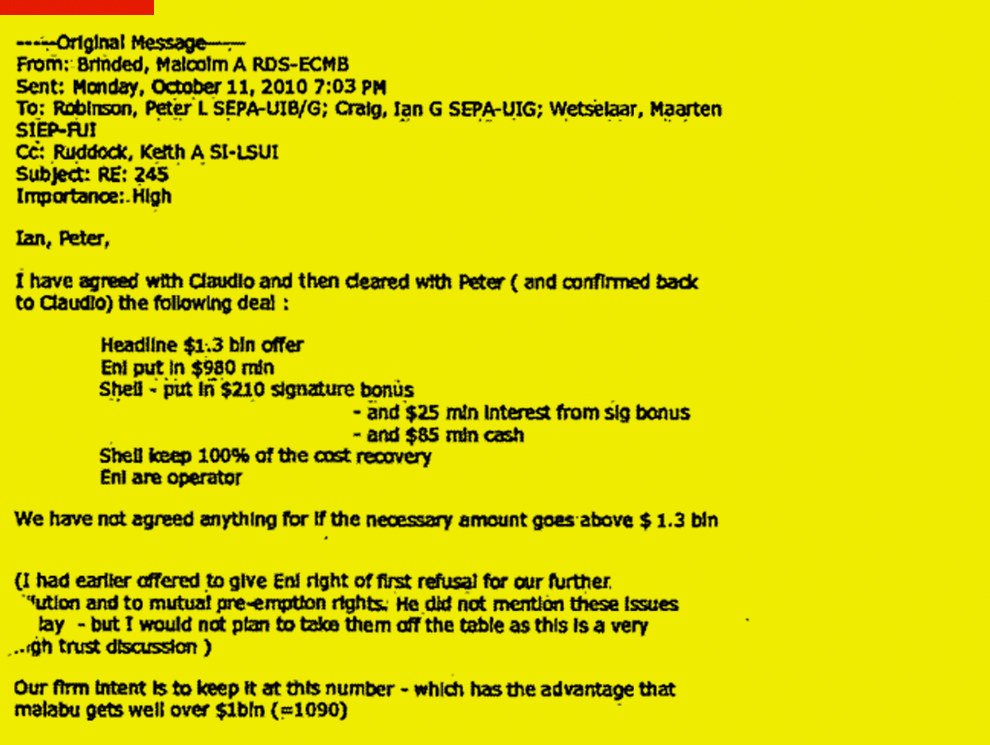
Brinded also noted the new structure “has the support of all including Peter Voser; simon [chief financial officer Simon Henry]”.
The final version of the structure was set up to transfer the $1.09 billion to a London bank account in the name of the government of Nigeria, which then in turn relayed the payment to entities eventually connected with Malabu – meaning that no money from Shell and ENI went directly to Malabu or Etete, even though the deal then benefited Malabu and associates greatly.
Even at the time, Shell’s senior figures were also aware of the public scrutiny and concern around any deal involving Etete. As Shell negotiated with Etete, Keith Ruddock, one of its general counsels, had been attending a meeting of the Extractive Industries Transparency Initiative – a global standard to promote the open and accountable management of oil gas and mineral resources that Shell subscribes to – and was asked about Etete.
“I was buttonholed on this by a number of Revenue Transparency related NGOs,” he said. “They had read about a possible transaction in the press and were keen to be reassured that Chief E. would not benefit from this deal. I was noncommittal on whether any deal was in prospect but indicated that Shell was indeed aware of Chief E’s history and would conduct its activities accordingly.”
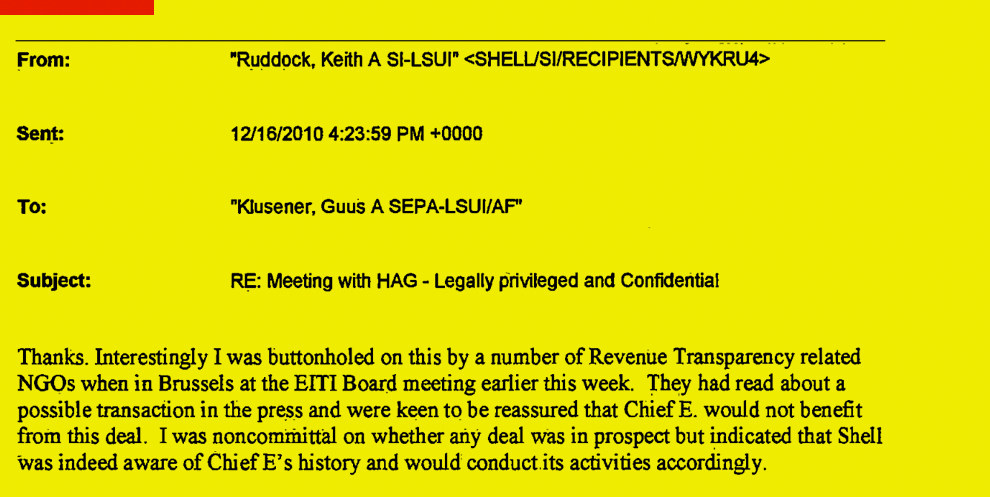
In a later note he commented, “they were clearly unaware of the details of this proposed transaction (at least I hope so) but it is an indication of how closely this deal will be scrutinised”.
After the deal came a hiccup: The money was first transferred to an escrow account opened in London by the Nigerian Treasury, which then made repeated efforts to forward the money to accounts connected to Malabu but kept being stopped as two different banks refused the transactions for fear of possible money laundering.
“Informally … we were informed that the payment from FGN [Nigerian government] to Malabu has been rejected by the receiving swiss bank on compliance grounds,” one internal Shell email noted. “Funds have been returned to the FGN account.”
The companies appeared to take the view that they could continue with development, as their deal was with the government of Nigeria, not with Malabu.
“ENI confirmed that money is still in FGN escrow,” he noted. “ENI's position is that they officially don't know and is not of their business any dealings between Malabu and FGN,” the Shell executive continued. “ENI together with Shell own the license and we are proceeding with a development.”
In a letter to Dutch authorities, an Italian prosecutor said he had tracked $737 million of transfers “made in the days immediately following the transfer of the sum from the United Kingdom to the Malabu accounts in Nigeria”.

“I heard from Chief, he claims that he had to pay 400 million”
Dealing with Etete was not the companies’ only concern around the deal. In the summer of 2010, the former MI6 agents warned Shell of the purported involvement of Goodluck Jonathan – Nigeria’s president from 2010 to 2015 – which they assumed meant he was looking to get a payout from OPL 245. That would have posed a risk under several jurisdictions’ laws on overseas bribery. Jonathan and Etete had known each other for years, according to Shell staff, when Jonathan served as a tutor to Etete’s children while he was a minister.
“Etete claims he has and has shown (though not copied) a letter from President reiterating malabu’s 100pc equity/contract ‘award’,” an email from Colegate stated. “This letter clearly an attempt to deliver significant revenues to GLJ [Jonathan] as part of any transaction.”

The former M16 officer also noted: “this is about personal gain and politics”.
These allegations about Goodluck Jonathan – and other alleged bribes – were repeated by Ednan Agaev, a former Russian ambassador and intelligence officer. Agaev had been engaged in the OPL 245 negotiations with Shell, representing Malabu. Agaev said he had been told he would receive commission of $65 million for negotiating the deal, but said he never received it, later giving testimony to the FBI and Italian prosecutors.
In an account of his interview given by the FBI to prosecutors, the agency stated:
“Agaev was asked about payment of his commission. Agaev stated that he went to Etete and told him to pay him the $65,000,000 fee. Agaev stated that Etete said, ‘I can’t pay you, I have to pay Adoke [Mohammed Bello Adoke, then Nigeria’s attorney general] $400 million and all the other people in the Senate and the National assembly.’ Agaev stated that he would think President Goodluck Jonathan got at least $200 million of this money.”
In a follow-up interview with Italian authorities, Agaev repeated his allegations. “I said that if it's true, that he paid, he had to pay 400 million, I assume that at least 200 went to Goodluck,” he said. “I heard from Chief, he claims that he had to pay 400 million, so, if this is true, if he paid 400 million, then most probably the President, as the biggest boss, took at least the half of it.”
Adoke has been charged with corruption offences in Nigeria in connection to the OPL 245 deal, and last week authorities were seeking a warrant for his arrest as he was outside of the country. He has consistently denied any wrongdoing.
In a December 2016 statement, he said: “I am of the respectful view that it should be clear to any person dispassionately reviewing the transaction to confirm that I had no personal interest in the transaction; I did not take any benefit from it, I had requisite approvals from the President and Commander in Chief of the Federal Republic of Nigeria to broker the settlement and execute the OPL 245 Settlement Agreement.”
Attempts to reach Agaev for comment were not returned.
Goodluck Jonathan could not be reached for comment by BuzzFeed News, but has strongly denied any allegations of corruption. In a statement issued in January through a spokesman, he said:
“We wish to make it clear that former President Jonathan was not accused, indicted or charged for corruptly collecting any monies as kickbacks or bribes from ENI by the Italian authorities or any other law enforcement body the world over … We will like to point out for the umpteenth time that whether in office or out of office, former President Jonathan does not own any bank account, aircraft or real estate outside Nigeria.”
The spokesman also said Jonathan had not sent an intermediary “to ENI, the IOCs [international oil companies] or any indigenous operator to seek favour or collect any gratification on his behalf”.
The authorities also took evidence from Jeffrey Tesler, a London lawyer who in 2011 entered into a plea agreement with US authorities in which he admitted guilt in distributing $130 million in corrupt payments to a number of Nigerian officials, including Etete, in a case unrelated to OPL 245.
Italian prosecutors contended that $180 million of the $1.09 billion sent to Malabu as a result of the Shell/ENI deal went to a bank account belonging to a front company. According to the Italian authorities, Tesler provided "professional services" to the company, and its controller was a Nigerian national “associated to senior Nigerian officials”.
On 9 January 2014, Tesler walked into Colindale police station in north London carrying a suitcase, which police discovered contained £378,670. The black Samsonite suitcase was seized after Tesler told police he had been approached by two Nigerian officials offering him a “gift” of $2 million they said was from Etete, for reasons he did not know, initially telling him he would need to collect the money in Nigeria.
In compliance with his plea deal in the US, Tesler notified authorities and did not travel to Nigeria, but was later offered the smaller amount of cash in the UK by the same officials, who gave him the suitcase in a London hotel – leading Tesler to hand it over to police, unopened, the next day. Prosecutors contend the money came from Etete and represented part of the proceeds of the Shell/ENI deal.
Tesler did not return a request for comment.

“We should have maybe at the time been more open with the DoJ”
In time and after sustained pressure and investigation from NGOs, particularly Global Witness and Re:Common, authorities became ever more concerned about the OPL 245 deal, leading to Italian and Dutch prosecutors setting up a joint investigation and carrying out the raid on Shell’s HQ in February 2016, prompting the intercepted phone call between Shell CEO Ben van Beurden and his chief finance officer, Simon Henry.
“I trust you have been informed about what happened at the office and the, er, fact that they have combed through both our rooms to get whatever information they needed,” van Beurden said. “Apparently they have been in my office for about three or four hours going through everything.
“I have nothing on OPL 245 but anyway they managed to take one folder which they thought was of relevance, er, no idea what that would be and apparently they have been in your office, they were still in your office … at the end of the afternoon.”
He continued: “And then I think they’re going to go to Chad [Holliday]'s office, which of course used to be Malcolm’s … there’s a whole stack of Malcolm’s stuff still in there so I have no idea what it is, but that could be ummm…” he said, trailing off.
Later in the call, van Beurden also said Shell was looking into whether or not it should have disclosed more to the US Department of Justice at the time of the OPL 245 deal. During that period, Shell was under a deferred prosecution agreement (DPA) – a deal made instead of prosecution – relating to previous charges of corruption in Nigeria. The terms of the deals generally require information to be disclosed to outside organisations monitoring the company.
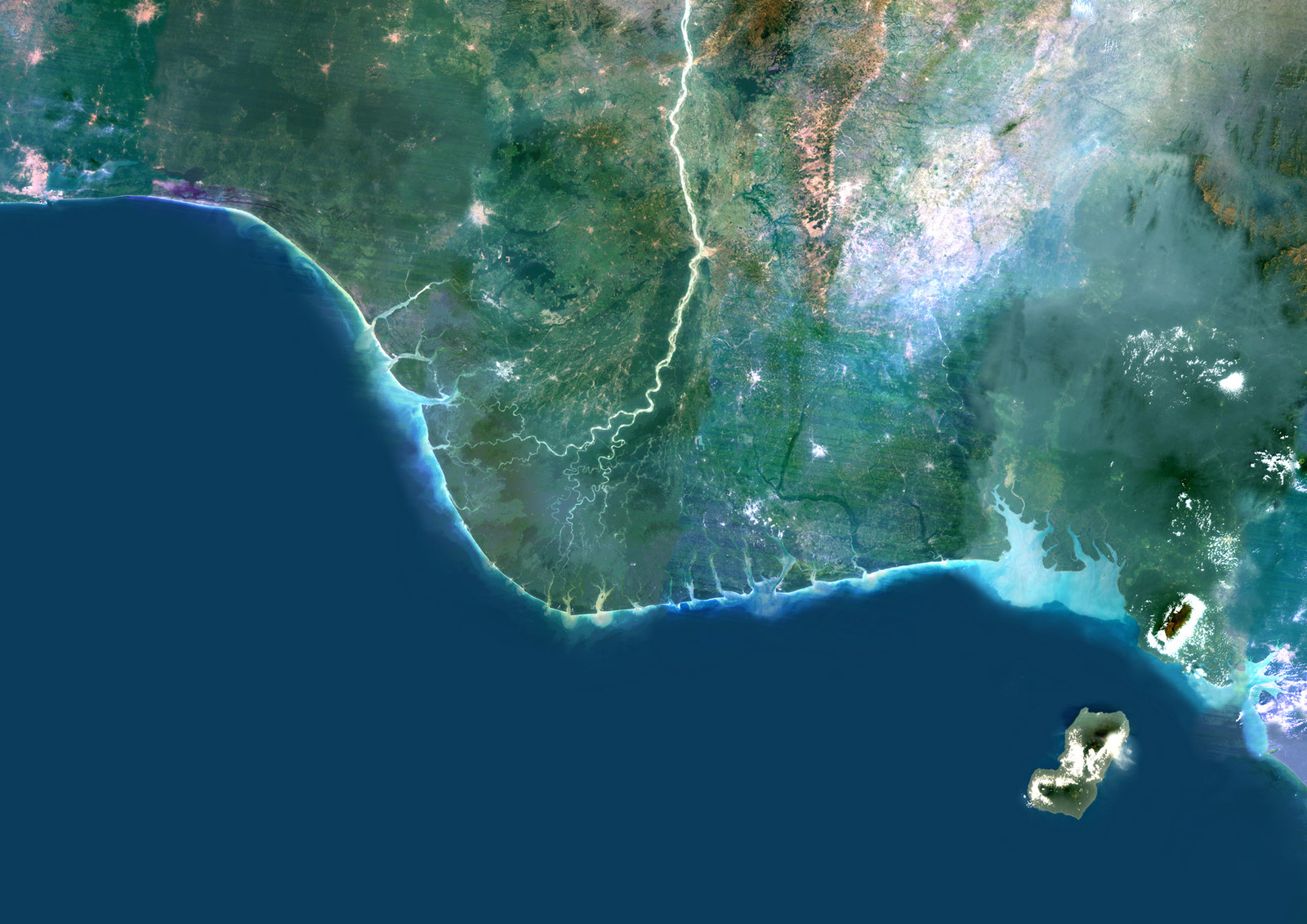
“When it’s all done, we have to make up our mind whether we just say: ‘Well, that’s it. We’ve investigated everything that could be investigated, and now we don’t… we concluded there is nothing wrong. And we’ll put it to rest,’” he said, “or whether we just say: ‘Well, y’know, there’s a few funny things here. Maybe we should just disclose it to the DoJ, because it all happened at a time we were, of course, under deferred prosecution agreement. So we should have maybe at the time been more open with the DoJ than we now find we have been.’”
BuzzFeed News and Il Sore 24 Ore asked Shell a series of questions about its role in the OPL 245 deal, including whether it has contacted the DoJ with its concerns over the DPA, whether it contacted the Serious Fraud Office over the raid on its offices, and what policies and practices it had in place to prevent bribery or corruption from the proceeds of the OPL 245 deal. The company provided the following statement:
“Given this matter is currently under investigation, it would be inappropriate to comment on specifics. However, based on our review of the Prosecutor of Milan's file and all of the information and facts available to Shell, we do not believe that there is a basis to prosecute Shell.
“Furthermore, we are not aware of any evidence to support a case against any former or current Shell employee. If the evidence ultimately proves that improper payments were made by Malabu or others to then current government officials in exchange for improper conduct relating to the 2011 settlement of the long-standing legal disputes, it is Shell’s position that none of those payments were made with its knowledge, authorization or on its behalf.
“We are taking this matter seriously and are fully co-operating with the relevant authorities. This includes when appropriate having shared the key findings of an investigation led by Debevoise & Plimpton LLP, an independent international law firm. We have also accurately reported on the OPL 245 settlement in our annual reports.
“Shell attaches the greatest importance to business integrity. It’s one of our core values and is a central tenet of the Business Principles that govern the way we do business.”
BuzzFeed News and Il Sore 24 Ore also contacted ENI with respect to its role in the deal. A spokesman replied:
“Neither ENI nor Shell paid any monies other than as contemplated and recorded by the Block Resolution Agreement and did not pay to Malabu, to Chief Dan Etete or to any public officer. ENI is not involved in any investigation in The Netherlands …
“The payments made by ENI and Shell to the Nigerian government for title to OPL 245 were made to an escrow account with an international bank held by the Federal Government of Nigeria pursuant to the Block 245 Resolution Agreement. Neither ENI nor Shell paid any monies other than as contemplated and recorded by the Block Resolution Agreement and did not pay to Malabu, to Chief Dan Etete or to any public officer …
“ENI and Shell are fully cooperating with the relevant authorities in Italy and in Nigeria. We shall continue to cooperate with relevant authorities in the investigations and continue to underscore the fact that ENI and its personnel have not been involved in any wrongdoing.”


